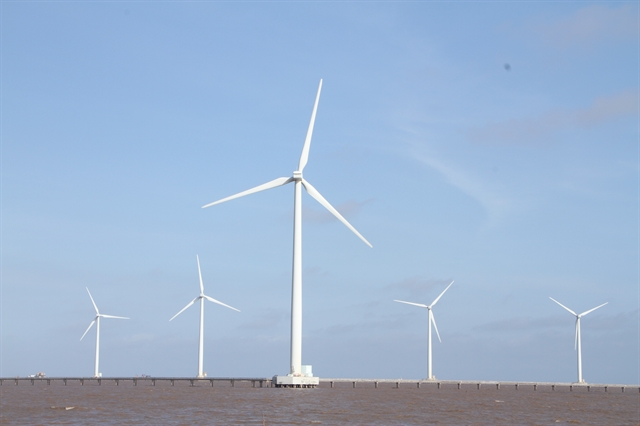 Economy
Economy


|
| Dong Hai No.1 wind power projects in Bac Lieu Province.Việt Nam sets a target of developing offshore wind power by 2045. -- VNA/VNS Photo Chanh Đa |
HÀ NÔI – Việt Nam is striving to produce about 3,000-5,000 MW of offshore wind power by 2030 and 21,000 MW by 2045, experts said during a webinar.
The webinar was held on Wednesday with a view to gather policymakers, researchers and businesses and organisations to exchange views on the prospects of offshore wind power, as well as holding discussions on environmental and social impact assessment regulations in Việt Nam.
Addressing the seminar, Chairman of the Việt Nam Union of Science and Technology Associations (VUSTA) Phan Xuân Dũng said the country would benefit from the development of offshore wind power, whose cost would gradually decrease in the future. And the development would also help create new jobs, attract investment, and reduce carbon emissions.
Many at the event said the country still lacked legal regulations on environment impact assessment and technical standards for the production, installation, operation, and maintenance of offshore wind power despite having a lot of potential.
An insufficient legal basis has resulted in differences between domestic environment impact assessment and international standards, according to Cao Thị Thu Yến from the Việt Nam Initiative for Energy Transition (VIET).
Yến noted offshore wind power projects occupying a vast area might overlap with other activities in oil and gas exploitation, telecommunications, and habitats of seabirds, fish, and coral, among others. She added investors, therefore, should consider environmental and social regulations for good compliance in addition to information on investment cost and license time.
Nguyễn Chu Hồi, deputy head of the Việt Nam Fisheries Society (VINAFIS), stressed the importance of singling out projects that harm the maritime environment, ecology, and fishing. Therefore, concise and detailed regulations would enable the authorities to do that in an easy way.
Hồi said: “The environmental impact assessment must be done carefully, for example, on how the impact of underwater sound on corals and sea creatures is and how to avoid overlapping development of wind power, oil and gas, and fishing.”
Deputy General Director of Russia-Vietnam Joint Venture (Vietsovpetro) Vũ Mai Khanh said the role of State-run agencies in verifying environment impact assessment and supervising the projects is essential to the development of the projects.
Andy Ho, head of Government and Regulatory Affairs, Asia-Pacific New Markets at Danish multinational power company Ørsted A/S, recommended that environment impact assessments should be in line with international standards to facilitate the investment.
Yến from VIET said there is a need to issue a legal document that meets international standards to make EIA the foundation for the authorities’ decisions on licensing and supervising offshore wind power projects.
According to experts, a mechanism for offshore wind power purchase is also necessary to stimulate this market.
They also suggested the State devise a specific mechanism for developing offshore wind power farms since this type of renewable energy will generate sustainable benefits, helping to guarantee energy security and promote citizens’ sense of responsibility towards the protection of Việt Nam’s maritime sovereignty. – VNS




